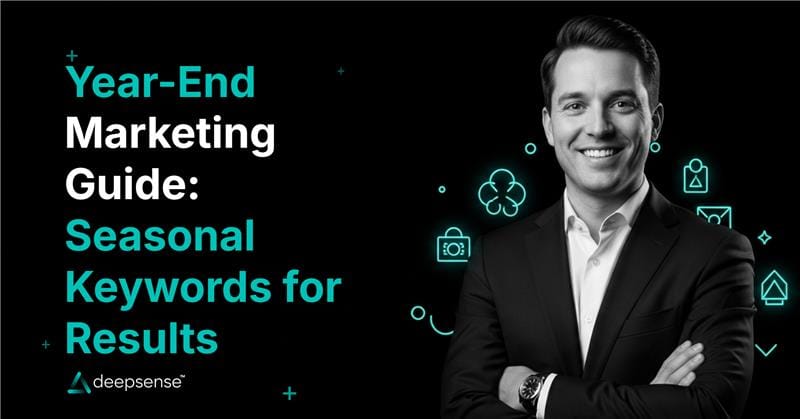Introduction: The Holiday Hustle
The year-end period is a critical time for businesses to capitalize on increased consumer activity. Mastering seasonal keywords marketing is essential for boosting visibility and sales during this peak shopping season, which includes events like Black Friday and New Year’s. Understanding and leveraging seasonal keyword optimization is crucial for capturing holiday shopper attention and driving significant results.
Evolution of Seasonal Marketing
Historically, holiday marketing relied on tangible assets like print catalogs and window displays, with “keywords” being literal words in headlines and descriptions. The internet transformed search engines into digital storefronts. Early SEO for the holidays focused on broad terms like “Christmas gifts” or “holiday deals.” Today, digital marketing is more sophisticated, with AI advancements like Google’s Helpful Content System shifting the focus from mere targeting of broad seasonal keywords marketing to creating relevant, user-intent-driven, and valuable content. Effective seasonal keyword research combined with an understanding of evolving consumer needs is vital for year-end digital marketing.
Current Trends in Seasonal Keywords
Smart marketers are moving beyond generic terms to focus on long-tail, niche seasonal keywords marketing, such as “eco-friendly stocking stuffers” or “vegan Thanksgiving recipes,” to connect with specific, high-intent audiences.
- Intent is King: Understanding the “why” behind searches is paramount, differentiating between users in the early browsing, comparison, or purchase stages.
- Content is Crucial: Keyword stuffing is obsolete; helpful, high-quality content that answers questions and anticipates needs is rewarded by Google’s algorithms, especially for seasonal content ideas where users seek inspiration and advice.
- EEAT Matters: Google emphasizes Expertise, Experience, Authoritativeness, and Trustworthiness (EEAT). For holiday season SEO, this means positioning brands as trusted sources for holiday gift ideas, festive marketing tips, or seasonal advice through expert authors, data-backed insights, and clear sourcing.
Controversies and Challenges in Year-End Marketing
The competitive nature of year-end marketing strategies presents several challenges:
- Over-Competition: Standing out amidst the noise for terms like “holiday deals” and “Black Friday sales” requires creative keyword targeting and unique content angles, especially without massive ad budgets.
- Algorithm Volatility: Google’s continuous updates, particularly core updates focusing on helpfulness, can drastically alter search rankings, making last year’s seasonal keyword optimization strategies potentially ineffective. Agility and monitoring seasonal search trends are critical.
- Burnout & Fatigue: Consumers are bombarded with marketing messages, making it challenging to cut through the noise with fresh, relevant content without overwhelming the audience, necessitating strategic timing and personalized messaging.
- Predicting the Unpredictable: Rapid emergence of new trends and product demands (e.g., “cottagecore gifts”) requires marketers to be adaptable and adjust how to use seasonal keywords strategies and content plans on the fly.
Future Developments in Seasonal Keywords Marketing
The landscape of seasonal keywords marketing is evolving with several key developments:
- AI-Powered Personalization: Expect more tailored search results based on individual user preferences, demanding more granular and context-specific seasonal keyword optimization.
- Voice Search Optimization: Optimizing for conversational, natural language queries will be vital as voice assistants become more common.
- Visual Search: Optimizing visual content with descriptive tags and relevant keywords will be necessary as image and video search capabilities grow.
- LLM Understanding: Content structured for clear comprehension by LLMs will be critical for future search and AI-driven content generation, emphasizing clear headings, explicit definitions, and robust semantic SEO for holiday SEO guides.
- Increased EEAT Emphasis: Demonstrating brand authority and trustworthiness through comprehensive author bios, transparent data citations, and expert opinions will become non-negotiable for ranking seasonal marketing content.
Frequently Asked Questions:
Q1: What is seasonal keywords marketing?
A1: It involves identifying and leveraging keywords with significant search volume spikes during specific times of the year (holidays, events, seasons) to boost visibility and sales.
Q2: Why is understanding user intent crucial for seasonal keywords?
A2: It’s about understanding why people search, allowing content to be tailored to whether a user is browsing, comparing, or ready to purchase, thus connecting with high-intent audiences.
Q3: How do Google’s algorithm updates affect seasonal SEO?
A3: Updates focusing on helpfulness can drastically alter rankings, requiring marketers to stay agile and monitor seasonal search trends as last year’s strategies may not work this year.
Q4: What is EEAT, and how does it apply to holiday season SEO?
A4: EEAT (Expertise, Experience, Authoritativeness, Trustworthiness) means positioning brands as trusted sources for seasonal advice and gift ideas through expert content and data-backed insights for holiday season SEO and festive marketing tips.
Q5: How can businesses stand out amidst high competition during year-end marketing?
A5: Businesses can stand out by using long-tail, niche keywords, creating genuinely helpful and EEAT-rich content, employing creative angles, and using strategic timing and personalized messaging.
Conclusion: Your Seasonal Keyword Action Plan
Seasonal keywords marketing is dynamic, requiring historical data analysis, trend observation, and a forward-thinking approach. To succeed, begin seasonal keyword research early, diversify keyword portfolios for broad and niche audiences, and focus on creating genuinely helpful, EEAT-rich content that resonates with user intent. Brands should aim to be the helpful resource that consistently captures seasonal demand and drives results.











